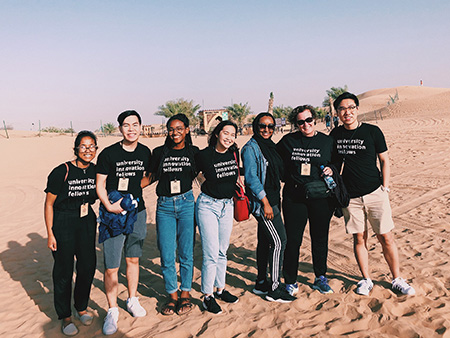Media contact: Alicia Rohan
 The six University Innovation Fellows in Dubai.In April 2019, six University of Alabama at Birmingham students returned to the United States from Dubai after attending a University Innovation Fellows conference and workshop. These students were named fellows in the fall and spring of 2018 — a prestigious recognition that teaches leaders how to bring about change in a diverse range of areas on their campuses.
The six University Innovation Fellows in Dubai.In April 2019, six University of Alabama at Birmingham students returned to the United States from Dubai after attending a University Innovation Fellows conference and workshop. These students were named fellows in the fall and spring of 2018 — a prestigious recognition that teaches leaders how to bring about change in a diverse range of areas on their campuses.
The 2019 Eastern Hemisphere meetup in Dubai featured project collaborations, build-your-own conference days and motivational speakers to forge connections among all students, despite any cultural differences. Jason Zhang, a sophomore majoring in biomedical engineering from Montgomery, Alabama; Marrielle Santiago, a junior majoring in neuroscience from Mobile, Alabama; and 2018 fellow Joshua Lim, a senior majoring in psychology from Mobile, Alabama, were all in attendance and provided answers about their experience and growth.
The conference focused on expanding knowledge of design thinking — a process used by the world’s greatest innovators — and focused on reframing problems in a mindset that is concentrated on empathy with others.
Q: What did you learn in Dubai?
Zhang: Meeting driven, passionate and brilliant agents of change from all over the world allowed me to learn about a diverse range of cultures and the Eastern higher-education system. I also learned about design thinking in further depth, especially pertaining to the concept of prototyping and using effective and efficient ways to test the validity, value and market acceptability of an idea or concept.
Santiago: I learned a lot of applicable skills and concepts from the various workshops we did in Dubai — from the importance of psychological safety within teams to designing experiments to test prototypes.
Lim: The most valuable part of the experience was meeting and hearing from successful entrepreneurs based in Dubai. They shared their stories, which showed us that innovation in their region was unique. The entrepreneurs had a much different set of challenges to face than entrepreneurs in areas like Silicon Valley. No matter where you are, there is always an opportunity to improve people’s lives through innovation. It just takes empathy and a creative mindset.
Q: How did your experiences and education at UAB prepare you for this experience?
Zhang: The diverse educational environment at UAB prepared me to be more culturally aware abroad. UAB’s emphasis on research and sustainability led me to have many intense and thought-provoking discussions on a range of topics and ideas with other fellows from across the world at the meetup.
Santiago: Before being initiated into this program, my group participated in online training modules together. Coordinating our schedules and establishing equal roles within the group were very important in ensuring we completed all of our assignments successfully. Doing this together before we embarked on the trip helped us go from colleagues to teammates. In addition, I would say that all of my group projects at UAB prepared me the most for the many collaboration-based aspects of this program.
Lim: UAB is a very culturally diverse institution. Interacting daily with students from different geographic backgrounds really prepared me for the culturally immersive experience in Dubai. Having regular exposure to cultural diversity equipped me with the necessary mindset to interact with fellows from all over the world.
Q: How will this experience shape your work on Project Blazer and Innovation Road Map? Any big changes to the projects?
Zhang: I feel more prepared for working on Project Blazer and Innovation Road Map from this experience. The workshops and other fellows provided useful ideas and a strong drive to make change on campus. I have a better knowledge base and more hands-on experience in design thinking to excel in future projects.
Santiago: During the conference, we attended a wide range of workshops that enabled us to dive deep into concepts such as prototyping and practical strategies to test our product. These skills will be extremely useful to implement into our future projects on campus.
Q: How will this experience impact you moving forward?
Zhang: I am fueled up and ready to make some changes on campus after this experience. Through design thinking, I hope to solve problems by using the design thinking skillset I learned at the conference.
Santiago: From this trip, I gained a broader perspective on the world by getting the opportunity to travel, meet people and learn with them. I also feel very inspired from having the opportunity to listen to several innovators’ moving stories about their personal journeys to success.
Lim: We spent a lot of time going through design thinking exercises that pushed us to solve problems in unconventional ways and collaborate more effectively. We networked with fellows from all over the globe and established some great friendships. Both of these things will positively impact the way I work and socialize in the future.
Q: Has this experience encouraged you to continue on the same career path, or have you made any adjustments?
Zhang: I have become even more strong-willed to pursue a career in the biomedical field. I feel confident to bring my skills as an innovator, inventor and engineer to the table in my future.
Santiago: I’m a rising senior, so there’s a lot of pressure about what I’m planning to do after college. This experience was enlightening because it encouraged me to take risks and to feel more confident about myself, my skillset and my future.
Lim: The experience, which included talks from several successful entrepreneurs, has encouraged me to continue being innovative and to pursue work in the startup world.